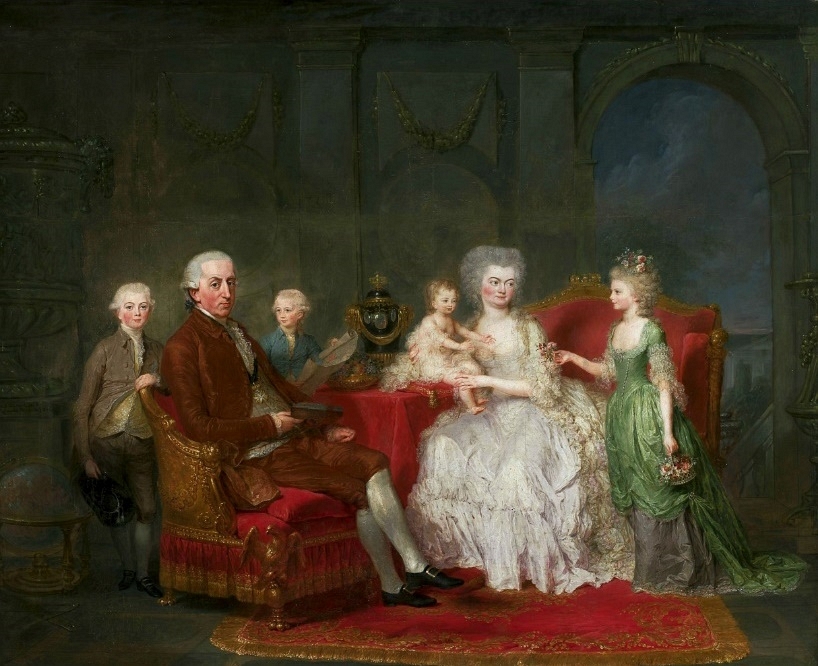by Scott Mehl © Unofficial Royalty 2019

Friederike Luise of Hesse-Darmstadt, Queen of Prussia; Credit – Wikipedia
Friederike Luise of Hesse-Darmstadt was the second wife of King Friedrich Wilhelm II of Prussia. She was born in Prenzlau, Kingdom of Prussia, now Brandenburg, Germany, on October 16, 1751 to Ludwig IX, Landgrave of Hesse-Darmstadt and Caroline of Zweibrücken. Friederike Luise had seven siblings:
- Caroline (1746-1821) – married Friedrich V, Landgrave of Hesse-Homburg, had issue
- Ludwig I, Grand Duke of Hesse (1753-1830) – married Luise of Hesse-Darmstadt, had issue
- Amalie (1754-1832) – married Karl Ludwig, Hereditary Prince of Baden, had issue
- Wilhelmine Luise (1755-1776) – married the future Paul I, Emperor of All Russia, had issue
- Luise Auguste (1757-1830) – married Karl August, Grand Duke of Saxe-Weimar-Eisenach, had issue
- Friedrich (1759-1802) – unmarried
- Christian, Landgrave of Hesse-Darmstadt (1763-1830) – unmarried

Friederike Luise with her husband and children, circa 1777. source: Wikipedia
On July 14, 1769, at Charlottenburg Palace in Berlin, Kingdom of Prussia, now in the German state of Brandenburg, Friederike Luise married the future King Friedrich Wilhelm II of Prussia as his second wife. The groom’s uncle, King Friedrich II (the Great) of Prussia, also Friederike Luise’s godfather, arranged the marriage. Despite their arranged and unhappy, marriage, they had seven children:
- King Friedrich Wilhelm III of Prussia (1770-1840) – married Luise of Mecklenburg-Strelitz, had issue
- Princess Christine (1772-1773) – died in infancy
- Prince Ludwig Carl (1773-1796) – married Friederike of Mecklenburg-Strelitz, had issue
- Princess Wilhelmine (1774-1837) – married King Willem I of the Netherlands, had issue
- Princess Auguste (1780-1841) – married Wilhelm II, Elector of Hesse, had issue
- Prince Heinrich (1781-1846) – unmarried
- Prince Wilhelm (1783-1851) – married Langravine Maria Anna of Hesse-Homburg, had issue
Friederike Luise faced resistance from her new Prussian family from the moment of her marriage. She was constantly compared to her husband’s first wife, who was much loved by the family and the Prussian people, despite having been divorced from her husband for both of their well-known affairs. Friederike Luise’s husband ignored and neglected her, choosing instead to spend his time with his official mistress and later two additional morganatic wives. Even King, Friedrich II, who had arranged the marriage, failed to give her the support and privileges her predecessor had enjoyed. So instead of being a major part of the Prussian court, Friederike Luise lived primarily in Potsdam, rarely permitted to visit Berlin.
In 1786, her husband became King of Prussia. Friederike Luise moved to Berlin and took up her role and duties as Queen. Still neglected by her husband, she often lacked the funds to pay for the basic needs of her household. The new King instead spent great amounts on his mistresses and focused more on his illegitimate children than his legitimate ones. The following year, the King decided to enter into a morganatic marriage with a lady-in-waiting Julia von Voss. Asked to consent to it, Friederike Luise agreed on the condition that her husband would pay off all of her debts. The same situation arose again three years later when the King wished to marry Sophie von Dönhoff. Relieved that she no longer had to receive her husband or bear him any further children, Friederike Luise again requested a significant financial settlement to consent to this marriage. She also had to deal with her husband’s official mistress Wilhelmine Ecke with whom he had several children, and who became his primary companion.

Monbijou Palace. source: Wikipedia
After moving to Berlin, Friederike Luise lived at Monbijou Palace, while her husband lived at the nearby Berlin Palace. Monbijou would remain her primary residence for the rest of her life. She spent her summers in the spa town of Freienwalde in 1788. Her presence increased the popularity of the small spa town and contributed greatly to its economy and success. As a result, many new buildings were built to accommodate her court. Following her husband’s death, she had a summer palace Schloss Freienwalde (link in German) built there, where she stayed each year until her death.

Schloss Freienwalde. photo: by Clemensfranz – Own Work, CC BY-SA 4.0, https://commons.wikimedia.org/w/index.php?curid=49554486
Widowed in 1797, the Dowager Queen lived a quiet and private life at her homes in Berlin and Freienwalde and enjoyed a close relationship with her son King Friedrich Wilhelm III. Increasingly eccentric as she got older, she claimed to see ghosts and became afraid of sleeping at night. As a result, she began to stay awake all night long and sleep during the day. On February 25, 1805, 53-year-old Friederike Luise suffered a stroke and died at Monbijou Palace in Berlin, Kingdom of Prussia, now in Brandenburg, Germany. She is buried in the royal vault at the Berliner Dom in Berlin.
This article is the intellectual property of Unofficial Royalty and is NOT TO BE COPIED, EDITED, OR POSTED IN ANY FORM ON ANOTHER WEBSITE under any circumstances. It is permissible to use a link that directs to Unofficial Royalty.
Prussia Resources at Unofficial Royalty
